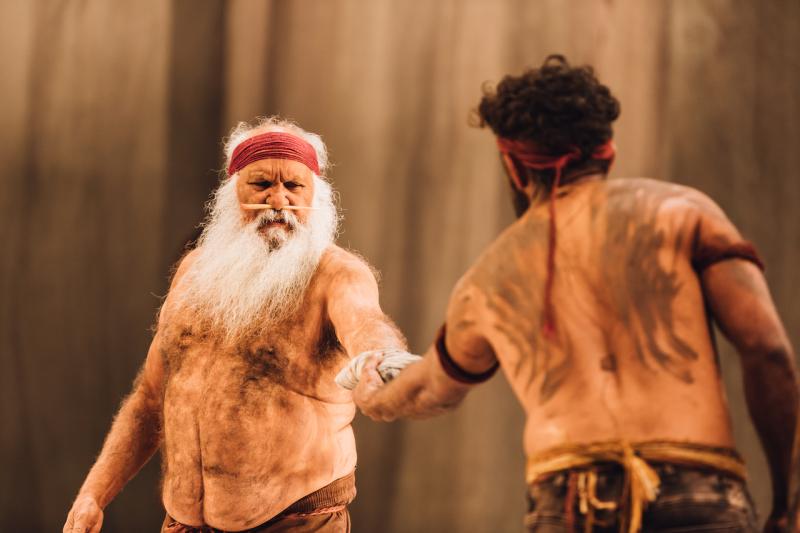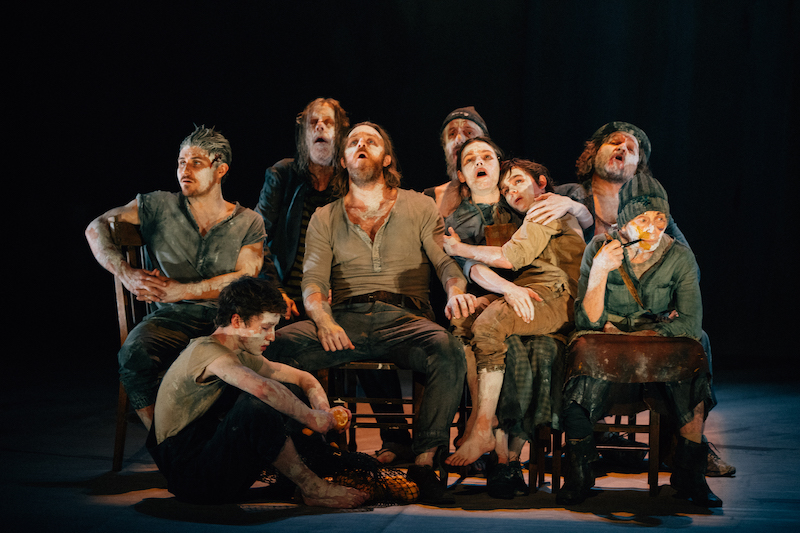The Secret River, National Theatre review - turbulent tale of Australia's past | reviews, news & interviews
The Secret River, National Theatre review - turbulent tale of Australia's past
The Secret River, National Theatre review - turbulent tale of Australia's past
A resonant tragedy of mutual incomprehension, fresh from the Edinburgh Festival

Neil Armfield’s resonant, turbulent production of Kate Grenville’s classic Australian novel The Secret River sing out from the stage of the Olivier like an epic, with its conflicts, culture clashes, and quest for new territories.
The play – which has been adapted by Andrew Bovell – gained an ardent following when it opened in Australia in 2013. This year its triumphant reception at the Edinburgh International Festival confirmed that this rich, multi-layered work could touch hearts internationally.
One of the most powerful directorial decisions has been to anchor the production firmly in an Aboriginal soundscape, potently evoking the theme of territorial songlines against designer Stephen Curtis’s recreation of the Outback. Though the music is subtly interwoven with traditional London ditties performed on the cello and open-fronted piano, it is the moment when Major “Moogy” Sumner AM steps forward and sings sonorously to the heavens that sets the tone both literally and metaphorically.
Nathaniel Dean plays William Thornhill, the former London petty thief who, following a pardon from King George III, announces to his homesick wife Sal that he wants to try and make a go of it in New South Wales. They make a deal that if he has not succeeded in establishing his territory after five years, they will return to England. In the mean time they and their two children will farm, hunt, and negotiate a precarious existence alongside the Dharug tribespeople.
As well as conveying historical tragedies this production has been hit by its own very personal tragedy: Ningali Lawford-Wolf, who was celebrated for her performance as the narrator, Dhirrumbin, in Edinburgh died suddenly on 11 August. Pauline Whyman has valiantly flown in from Australia to take on the role after a brief and intensive rehearsal period.
She does this well, but there is a palpable sense of shock, which is possibly why it – understandably – takes a little while for the production to hit its stride. As Thornhill struggles to make sense of the new world around him, the story’s gentle power builds with the shifting dynamics of each encounter between his family and the Dharug people. One of the best moments comes with the shrieks and the splashes of an improvised water-sliding game between Toby Challenor’s young Dick Thornhill, and Jacob Narkle and Wesley Patten’s Aboriginal children. Another is when Georgia Adamson’s bold, charismatic Sal Thornhill engages with Elma Kris’s Dulla Djin to compare foodstuffs, not least the decadent novelty of sugar. Yet the ever turbulent element of testosterone means that even as the women and the children start to work out ways of communicating, the men are turning increasingly to weapons. While Thornhill encounters one white settler who has formed a relationship with a Dharug woman, it is understood that this is strictly taboo: other ex-cons are openly racist and hostile.
Yet the ever turbulent element of testosterone means that even as the women and the children start to work out ways of communicating, the men are turning increasingly to weapons. While Thornhill encounters one white settler who has formed a relationship with a Dharug woman, it is understood that this is strictly taboo: other ex-cons are openly racist and hostile.
This, with wretched inevitability, leads to a conclusion that is all the more devastating for what we’ve witnessed of the communications between the white and Aboriginal people. The story is made more effective for not taking sides – we are made to understand the fears and pressures weighing down on all involved. Yet there is a point when the crack of gunfire means that the subtlety of all music and words is annihilated. It is difficult not to be made wretched by a scenario which we are all-too-well aware played itself out again and again in the bloody path towards colonisation.
- The Secret River at the National Theatre until 7 September
- Read more reviews on theartsdesk
rating
Share this article
The future of Arts Journalism
You can stop theartsdesk.com closing!
We urgently need financing to survive. Our fundraising drive has thus far raised £49,000 but we need to reach £100,000 or we will be forced to close. Please contribute here: https://gofund.me/c3f6033d
And if you can forward this information to anyone who might assist, we’d be grateful.

Subscribe to theartsdesk.com
Thank you for continuing to read our work on theartsdesk.com. For unlimited access to every article in its entirety, including our archive of more than 15,000 pieces, we're asking for £5 per month or £40 per year. We feel it's a very good deal, and hope you do too.
To take a subscription now simply click here.
And if you're looking for that extra gift for a friend or family member, why not treat them to a theartsdesk.com gift subscription?
more Theatre
 The Daughter of Time, Charing Cross Theatre review - unfocused version of novel that cleared Richard III
The writer did impressive research but shouldn't have fleshed out Josephine Tey’s story
The Daughter of Time, Charing Cross Theatre review - unfocused version of novel that cleared Richard III
The writer did impressive research but shouldn't have fleshed out Josephine Tey’s story
 Evita, London Palladium review - even more thrilling the second time round
Andrew Lloyd Webber's best musical gets a brave, biting makeover for the modern age
Evita, London Palladium review - even more thrilling the second time round
Andrew Lloyd Webber's best musical gets a brave, biting makeover for the modern age
 Maiden Voyage, Southwark Playhouse review - new musical runs aground
Pleasant tunes well sung and a good story, but not a good show
Maiden Voyage, Southwark Playhouse review - new musical runs aground
Pleasant tunes well sung and a good story, but not a good show
 The Winter's Tale, RSC, Stratford review - problem play proves problematic
Strong women have the last laugh, but the play's bizarre structure overwhelms everything
The Winter's Tale, RSC, Stratford review - problem play proves problematic
Strong women have the last laugh, but the play's bizarre structure overwhelms everything
 Brixton Calling, Southwark Playhouse review - life-affirming entertainment, both then and now
Nostalgic, but the message is bang up to date
Brixton Calling, Southwark Playhouse review - life-affirming entertainment, both then and now
Nostalgic, but the message is bang up to date
 Inter Alia, National Theatre review - dazzling performance, questionable writing
Suzie Miller’s follow up to her massive hit 'Prima Facie' stars Rosamund Pike
Inter Alia, National Theatre review - dazzling performance, questionable writing
Suzie Miller’s follow up to her massive hit 'Prima Facie' stars Rosamund Pike
 A Moon for the Misbegotten, Almeida Theatre review - Michael Shannon sears the night sky
Rebecca Frecknall shifts American gears to largely satisfying effect
A Moon for the Misbegotten, Almeida Theatre review - Michael Shannon sears the night sky
Rebecca Frecknall shifts American gears to largely satisfying effect
 Burlesque, Savoy Theatre review - exhaustingly vapid
Adaptation of 2010 film is busy, bustling - and bad
Burlesque, Savoy Theatre review - exhaustingly vapid
Adaptation of 2010 film is busy, bustling - and bad
 Don't Rock the Boat, The Mill at Sonning review - all aboard for some old-school comedy mishaps
Great fun, if more 20th century than 21st
Don't Rock the Boat, The Mill at Sonning review - all aboard for some old-school comedy mishaps
Great fun, if more 20th century than 21st
 The Estate, National Theatre review - hugely entertaining, but also unconvincing
Comedy debut stars Adeel Akhtar, but is an awkward mix of the personal and the political
The Estate, National Theatre review - hugely entertaining, but also unconvincing
Comedy debut stars Adeel Akhtar, but is an awkward mix of the personal and the political
 That Bastard, Puccini!, Park Theatre review - inventive comic staging of the battle of the Bohèmes
James Inverne enjoyably reconstructs the rivalry between Puccini and Leoncavallo
That Bastard, Puccini!, Park Theatre review - inventive comic staging of the battle of the Bohèmes
James Inverne enjoyably reconstructs the rivalry between Puccini and Leoncavallo

Add comment